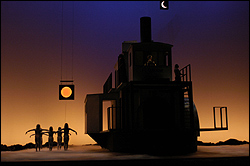Seattle Opera’s 1998 staging of Daniel Catán’s luscious Florencia in the Amazons was so well-received the opera decided it had to return; the revival (through Sat., March 12, at McCaw Hall, 206-389-7676) reveals an opera even more moving and alluring than I remember it.
Florencia Grimaldi is a diva traveling upriver to Manaus for three reasons—to sing at the city’s legendary opera house, to escape the psychic burden of European celebrity (“I am not my name,” as she puts it), and to search for a long-lost lover. In bringing this magical-realist fable to the stage, Catán—who was commissioned to write the piece by Seattle Opera and two other companies back in 1996—and director Andrew Morton embrace artificiality and imaginative simplicity. The movements of the chorus and a five- person ballet troupe (representing darkly mischievous river sprites) are stylized; the sun and moon are illuminated boxes hanging from very visible wires; the black curtains backing the opening scene drop to the floor as the steamer launches, lying in piles that evoke a silhouetted shoreline. There’s also a narrator, Riolobo, breaking the fourth wall, and most everyone gets a stand-and-sing introductory aria. It’s not a plot-driven piece—Florencia and her co-passengers express their longings in a dreamy chain of arias and duets, punctuated by gently dramatic natural events.
It’s also not a star vehicle, at least not in this production. Though Nancy Gustafson soars in the title role, the other characters on the boat are just as compelling, even more vividly drawn now than in 1998. Paula and Alvaro (Luretta Bybee and D’Arcy Bleiker, respectively) are middle-aged, well-to-do, and bored with each other, and Catán has written them a crackling argument duet. Rosalba is Florencia’s biographer; Frances Lucey’s sweet, lightly tremulous soprano in the role somehow perfectly suggests a life of sheltered bookishness. Trying to bring her out of her shell is the ship captain’s nephew, Arcadio (Lawrence Brownlee, whose vibrant tenor earned him an ardent curtain-call outburst on opening night), a romantic who dreams of travel—a Brazilian George Bailey dreading a life stuck in Bedford Falls. Luiz-Ottavio Faria as the captain made a fine rotund authority figure for him to clash with.
As Riolobo, Seattle Opera cast a singer with name-recognition value among opera fans: Nathan Gunn, whose career is deservedly burgeoning thanks to the rare combination of an exceptional baritone (rich, secure, fluent) and the sort of athletic, openhearted charisma that makes you forget who the tenor is. Interestingly, it turns out to be exactly the wrong kind of charisma for the role. Riolobo personifies the jungle itself, a magical spirit guide watching over the travelers, while Gunn is boyishly, hopelessly all-American. There’s not an atom of exoticism about him; he evokes the impenetrable mystery of the Amazon rain forest about as much as Curly does in Oklahoma!
Florencia‘s ravishing score nicely illustrates contemporary music’s primary paradox: Many of the musical styles and devices considered avant-garde or challenging have been sounding a bit tired, while compositional honesty and unself-consciousness remain ever fresh. Hearing Catán’s music, Debussy and Puccini are probably the first names that’ll come to mind, but Latin American touches in the tunes, rhythms, and orchestration beguile the ear, especially in the percussion department (lots of mellow marimba, dashes of djembe and steel pan). The woodwinds burble liquidly, the brass snarl at tense moments, and the 19-player string section is used discreetly rather than as a foundation. The scene-change music, especially a glorious sunrise drenched in birdsong, could—and should—be extracted for concert performance. “Difficult,” Catán’s music is not, but “daring” it is, in the sense that the term has always meant for composers—writing the music you need to write rather than the music you’re expected to write. It’s as true for Catán today as it was for Schoenberg a century ago and Beethoven a century before that.







